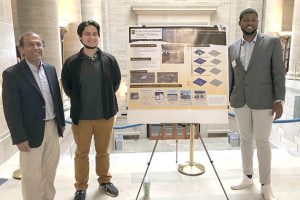
April 18, 2022
More than 60 engineering students to present at Undergraduate Research Week
More than 60 Mizzou Engineering students are presenting their research as part of MU Undergraduate Research Week.

April 13, 2022
Engineering undergraduates present research at Missouri Capitol
Missouri lawmakers this week heard about how Mizzou Engineering researchers are turning byproducts into nutritious foods, assessing water quality in the state and improving the accuracy of large-scale smart city synthetic environments

April 11, 2022
New web resource provides health, socioeconomic, other geospatial data
A Mizzou Engineering team has developed a web resource that allows users to sort and view health, socioeconomic, accessibility and population data by county.

April 1, 2022
Guidoboni elected a member of the European Academy of Sciences and Arts
Giovanna Guidoboni has been elected a member of the prestigious European Academy of Sciences and Arts, comprised of eminent scientists and scholars. Guidoboni is Associate Dean of Research for Mizzou Engineering and a Professor of Electrical Engineering and Computer Science with a joint appointment in Mathematics at the College of Arts and Science. “I’m honored to have been nominated and elected to this distinguished group,” Guidoboni said. “I look forward to representing Mizzou as I connect with other members from Europe and across the world.” The European Academy of Sciences and Arts brings together leaders in…

March 23, 2022
Harnessing the power of AI to advance knowledge of Type 1 diabetes
An interdisciplinary team of researchers from the University of Missouri, Children’s Mercy Kansas City and Texas Children’s Hospital has used a new data-driven approach to learn more about persons with Type 1 diabetes.

March 22, 2022
E-Week 2022: “Patapalooza” Celebration
Mizzou Engineering students, faculty, staff and alumni took part in what many consider the best week of the year - Engineers' Week!

March 21, 2022
Melton receives 2022 Missouri Honor Award
Michael Melton, Esquire, BS EE ’81, JD ’84, has received the 2022 Missouri Honor Award recognizing his outstanding contributions to Mizzou Engineering and extraordinary efforts to help support students and young alumni.

March 21, 2022
Stipek receives 2022 Citation of Merit
Lorraine Stipek, BS EE ‘86, has received the College of Engineering’s 2022 Citation of Merit Award recognizing her significant contributions to the industry and service to MU.

March 20, 2022
College recognizes outstanding faculty, staff, students
Mizzou Engineering recognized faculty, staff and students for outstanding performance and dedication to the College.

March 17, 2022
Mizzou Engineers are Mark Twain Fellowship Finalists
Three of the five 2022 Mark Twain Fellowship finalists are Mizzou Engineers.